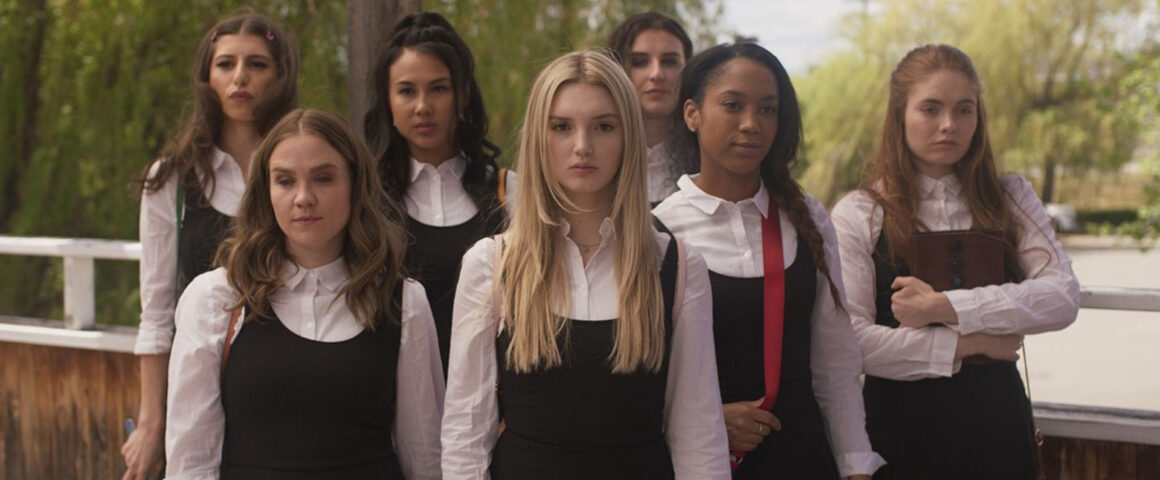Cinema can have a suffusive effect. Through a particular combination of image and sound, a film can feel as though it is breathing out and enveloping you with its influence. This can be the case with dreamy romances, where you are brought into the (potentially cloying) environment of overpowering love. It can also work for horror, and if a horror film suffuses you with its malevolence and menace, it’s working well and likely to unsettle.
In The Color Rose, released as “The Sinners” in the UK, writer-director Courtney Paige uses excessive lighting, dreamy music and shifts in the speed of action to create a suffusive, sensual and sinister tale of teenage rebellion gone horribly wrong. It’s not entirely successful, with some sections working better than others, but The Color Rose is discomfiting and involving in its world building and thematic expression. An early part of this establishment is the location, an isolated town surrounded by gorgeous mountains, deep forests and an ominous lake. Small wonder that the opening voiceover refers to the lake and a feeling of submergence pervades much of the film.
The location recalls the sublime in art, attempts to represent the majesty and terror of divine creation. This duality is further emphasized by the setting of a small and strictly religious town, where church and Bible study inform every part of life and sin is rigidly avoided. Except it isn’t because the film follows seven teenage girls dubbed “the Sins” by their classmates. Grace Carver (Kaitlyn Bernard, “The Professor”) is the leader of the group and the film’s antihero, dubbed Lust with a certain amount of irony, although certain sequences emphasize a sensuality in her that is almost tactile. Grace’s relationship with her family, especially her father Pastor Dean Carver (Tahmoh Penikett, “Painkillers”), is the source of considerable tension which boils over into violence that impacts the entire community. Tori Davidson (Brenna Coates, “Coroner” TV series) is Wrath, Grace’s close confidant and clandestine lover. Rich girl Katie Hamilton (Keilani Elizabeth Rose, “Woodland”) gets whatever she wants but her Greed is never satisfied. Stacey Rodgers (Jasmine Randhawa) has Envy for those around her. Molly McIvor (Carly Fawcett, “Night Sweats”), insecure about her body, comfort eats due to her Gluttony, while Robyn Pearce (Natalie Malaika, “Picture Day”) demonstrates her Sloth by coasting through school and athletics despite her natural gifts. Brenna Llewellyn (“CR: Complete Reality”) is Aubrey Miller, Pride and the narrator in a way that is, well, that would be telling.
Within their repressive community, the girls are a talking point and it is not long before they start their own little rebellion. And as you might expect, it isn’t long before things go too far. In constructing this story, Paige combines elements of teen drama, folk and occult horror. Holy verses rub shoulders with Satanic rituals, and a careless word can have severe repercussions. This is an interesting comment on religious dogma, as intolerance and judgment seem to be the watchwords of this community rather than love and forgiveness. When characters turn up dead, cries for vengeance and retribution drown out those of mourning.
The film’s presentation of teenage pranks leading to mob hysteria creates inevitable comparisons with “Heathers,” although the film lacks the strong satirical bite of that teen classic. The film is also reminiscent of “Scream” and “Mean Girls,” as well as “The Craft” with its incorporation of occult imagery. A more recent antecedent is 2018’s “Assassination Nation,” which was a scathing indictment of various social expectations. The Color Rose is less acerbic, but perhaps oddly has a warmer heart, since the girls at the center of the drama are presented as flawed and confused, trying to figure out how to be themselves when their elders regularly tell them they are not good enough. Religion works as a metaphor for gender repression here, as the girls’ school classes appear to consist of Bible study based on how well they know the material, yet it seems they can never know it well enough. The stricture on display may well provoke annoyance from disagreeing viewers, but it would be simplistic to view the film as a condemnation of religious dogma. The girls are recognizable from the genre entries as mentioned above, as much products of contemporary western society as they are of their specific niche of it. Also, the repression is largely implied rather than enforced, with nothing in the way of punishment as seen in something like “Carrie.” Thus, the notion of an expectant atmosphere and how one negotiates one’s own identity within that atmosphere is central to the film, again adding to the suffusive nature of The Color Rose.
The atmosphere of the film is its most effective element. Sometimes the style is inconsistent and a little jarring, such as Paige’s device of speeding up the action at moments of high tension. This can induce shock, but the device is used somewhat clumsily at times. More effective are the sudden inserts, such as moments of violence where we only see a little: As is often the case, suggestion can be more frightening than explication. Best of all are the slower moments, such as the girls walking through their high school with blatant disregard for their moral instructors, flesh on display as an act of defiance rather than spectacle. Speaking of display, as might be expected with a large cast like this, some of the characters receive more attention than others, with the film’s focus largely on Grace and Tori and the other girls somewhat sidelined. It is also a film of discordant narrative threads — a criminal investigation thread is somewhat mechanical, with Sheriff Fred Middleton (Aleks Paunovic, “Volition”) and Deputy Douglas Sanders (Taylor St. Pierre, “Last Night in Suburbia”) shifting from buffoonery to competency as the plot demands it. But despite these problems, The Color Rose still succeeds as an effective blend of repression, rebellion, teen terror and occult horror, largely because of the atmosphere that suffuses and discomforts the viewer.



